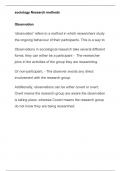5.
Sociology Research Methods - One limitation of Participant Observation 1
Answer: One limitation is that Ethical problems, such as deception, may be justified to protect the researcher, such as with Patrick’s study of Glasgow gangs. The study aimed to investigate the behaviours and dynamics of gangs. To gain access and build trust within the gang, Patrick concealed his true identity and purpose. This involved deceiving the gang members and potentially putting them at risk if they were to discover the researcher\\\\\\\\\\\\\\\\\\\\\\\\\\\\\\\\\\\\\\\\\\\\\\\\\\\\\\\\\\\\\\\\\\\\\\\\\\\\\\\\\\\\\\\\\\\\\\\\\\\\\\\\\\\\\\\\\\\\\\\\\\\\\\\\\\\\\\\\\\\\\\\\\\\\\\\\\\\\\\\\\\\\\\\\\\\\\\\\\\\\\\\\\\\\\\\\\\\\\\\\\\\\\\\\\\\\\\\\\\\\\\\\\\\\\\\\\\\\\\\\\\\\\\\\\\\\\\\\\\\\\\\\\\\\\\\\\\\\\\\\\\\\\\\\\\\\\\\\\\\\\\\\\\\\\\\\\\\\\\\\\\\\\\\\\\\\\\\\\\\\\\\\\\\\\\\\\\\\\\\\\\\\\\\\\\\\\\\\\\\\\\\\\\\\\\\\\\\\\\\\\\\\\\\\\\\\\\\\\\\\\\\\\\\\\\\\\\\\\\\\\\\\\\\\\\\\\\\\\\\\\\\\\\\\\\\\\\\\\\\\\\\\\\\\\\\\\\\\\\\\\\\\\\\\\\\'s true intentions. This is a limitation as it raises ethical concerns regarding informed consent and potential harm to participants. Deception can undermine the principle of participation, as participants were not aware that they were being observed.




